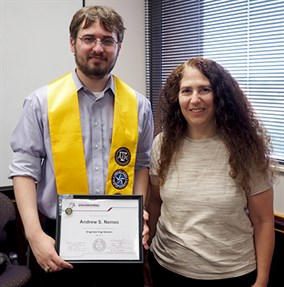 Andrew Nemec, a recent graduate from the Department of Computer Science and Engineering at Texas A&M University, held several prestigious distinctions during his undergraduate career including participation in Engineering Honors, Honors in Science, Honors in Mathematics, Honors Fellows and Undergraduate Research Scholars.
Andrew Nemec, a recent graduate from the Department of Computer Science and Engineering at Texas A&M University, held several prestigious distinctions during his undergraduate career including participation in Engineering Honors, Honors in Science, Honors in Mathematics, Honors Fellows and Undergraduate Research Scholars.
His participation in these programs is a credit to his dedication and willingness to surpass the expectations for his education. In summer 2015, Nemec began working alongside Dr. Andreas Klappenecker, a professor in the department, on quantum error-correcting codes over finite Frobenius rings. Frobenius rings are arithmetic structures that allow one to perform addition and multiplication.
Quantum computing is significant because it allows one to have the ability to solve problems much more quickly than traditional computing. This is because classical computing simply uses ones and zeroes for construction; instead of being restrained into using one number or the other, quantum computing sanctions the addition of those zeroes and ones together. This superposition of ones and zeroes allows for more efficient computing previously unavailable.
In quantum computing, the information is stored in the state of quantum mechanical systems. Since these systems interact with their environment, it is unavoidable that the stored information will be altered over time. Quantum error-correcting codes allow one to correct such errors. Nemec made rapid progress in this area, despite the fact that quantum error-correcting codes in this generality were largely unexplored territory.
The following semester, Nemec delved deeper into this research.
“Among other things, he generalized the famous Gleason-Prange theorem,” Klappenecker said.
Nemec’s theorem allows him to deduce that the quantum code has the same minimum distance as the classical code.
“This result is very impressive, as even the simpler original theorem of Gleason and Prange is considered difficult and rather inaccessible,” Klappenecker said.
Nemec plans to pursue a graduate degree from the department and credits much of his success to his professors and mentors in the department.
“My time at Texas A&M has helped me shape a path towards my career goals,” Nemec said. “Along the way I have been given a lot of support from the faculty, who through classes, research, and advising showed me the wide range of what I could do with computer science. This helped me find a field of research I was interested in — quantum error correcting codes — and spurred me to pursue a graduate degree.”
Image: Andrew Nemec and Engineering Honors Senior Director, Dr. Nancy Amato